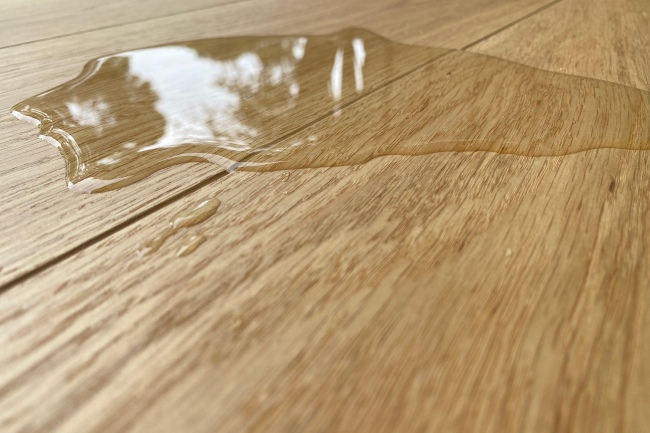Can Engineered Hardwood Get Wet?
8th Jun 2023
When it comes to choosing flooring options for your home or commercial space, oak is a popular choice. It's natural beauty and durability make it a sought-after material. However, there are often questions about the water-resistance capabilities of engineered hardwood flooring.
In this post, we will delve into the topic of whether engineered hardwood can get wet, specifically focusing on engineered oak flooring, and provide you with the necessary information to make an informed decision for your flooring needs.

Understanding Engineered Oak Flooring
Engineered oak flooring is crafted by layering multiple wood veneers and adhering them together to create a stable and durable flooring option. The top layer consists of solid oak, while the lower layers are typically made from plywood or fiberboard. This construction method enhances the stability of the flooring, making it less susceptible to expansion and contraction caused by moisture and temperature fluctuations. In affect, this makes engineered oak flooring more suitable for the likes of kitchens, bathrooms, and basements and a popular alternative to solid oak flooring.
Darkening & Potential Blackening
Exposure to water can have an impact on the appearance of oak flooring, including the potential for darkening or even turning black. When water penetrates the surface of the wood, it can react with the tannins naturally present in oak. When water comes into contact with these tannins, a chemical reaction may occur, resulting in a darkening effect on the wood. Over time, if the moisture issue persists or the water is not promptly addressed, the affected areas may darken further, potentially turning black. It is important to note that this color change does not necessarily indicate structural damage but rather an aesthetic alteration.

Water Resistance of Engineered Oak Flooring
While engineered oak flooring offers improved water resistance when compared to solid oak, it is essential to understand its limitations. The construction of engineered oak flooring provides a certain degree of protection against moisture, but it is not completely impervious to water. Extended exposure to water can still result in damage, making it crucial to take appropriate precautions to maintain its longevity and appearance.

Preventative Measures
To safeguard your engineered oak flooring from potential water damage, consider implementing the following preventive measures:
- Use high quality protective coatings: Applying a high-quality wood finish to your engineered oak flooring can provide an additional layer of protection against water and moisture.
- Wipe up spills promptly: Accidents happen, and spills are inevitable. However, it is essential to clean up any spills immediately to prevent water from seeping into the floorboards. Use a soft cloth or paper towel to absorb any liquid, ensuring no moisture remains on the surface.
- Use mats and rugs: Place mats or rugs in high-traffic areas, such as entrances and kitchen spaces, to prevent water from being tracked onto the floor. This adds an extra layer of protection and helps to trap excess moisture.
- Control humidity levels: Excessive humidity can negatively impact engineered oak flooring. Maintain a consistent, natural humidity level in your home or business space.
- Avoid soaking wet mopping: While routine cleaning is necessary, avoid using a soaking wet mop on your engineered oak flooring. Instead, use a slightly damp mop or a specialised wood floor cleaner.

Engineered oak flooring exhibits enhanced water resistance when compared to solid wood floors, making it a viable choice for areas that may experience occasional moisture exposure. However, it is important to remember that engineered oak flooring is not completely waterproof.
If you need further information regarding any aspect of engineered oak flooring, don't hesitate to contact us here or give us a call on 01538 304584.




Add a comment